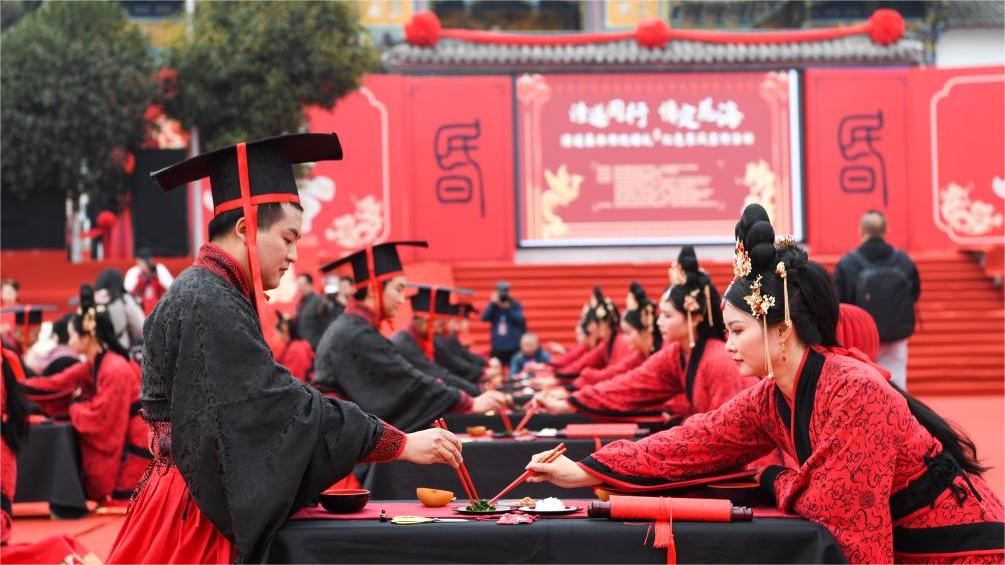How does Xi push through reform in adversity and dismantle vested interests?
BEIJING, March 12 (Xinhua) -- Chinese leader Xi Jinping has sounded the clarion call for reform during the country's annual key political season, dispelling concerns about whether China's reform is "stagnating," or its economy is "losing steam."
"We must plan major moves to deepen reform to inject strong impetus into promoting high-quality development and advancing Chinese modernization," President Xi said at the annual sessions of China's top legislature and top political advisory body, or the "two sessions," which wrapped up on Monday.
China is currently at a critical juncture, where Xi is leading the country to realize the ambitious "Chinese modernization," while being confronted with major challenges, such as downward economic pressure following the COVID-19 pandemic, rising protectionism and suppression from Western nations, and risks associated with the real estate sector, local government debts, and some small and medium-sized financial institutions.
Indeed, Xi has always been pushing through reform in adversity and had to break the blockades of vested interests. "We need the courage to 'venture into the mountain despite knowing full well there are tigers' and continuously move the reform forward," he said.
Around the year when Xi became the general secretary of the Communist Party of China (CPC) Central Committee, vote-buying corruption in the election of lawmakers or Party officials occurred in the provinces of Liaoning, Hunan and Sichuan.
"Corrupt officials allowed bribe-paying enterprises to illegally obtain projects or manipulate the market," said a local official, citing concerns over the business environment in the rustbelt northeastern provinces then.
Xi initiated an unprecedented anti-corruption "storm." The fight against corruption is beneficial for purifying the "political ecosystem" as well as the "economic ecosystem," and is conducive to straightening out the market order and restoring the market to what it should be, he said.
The "zero-tolerance" anti-corruption campaign continues to roar. In 2023, it made waves across sectors, including finance, grain, healthcare, semiconductors, and even sports.
Hundreds of high-ranking government officials, bank executives and hospital directors, even figures like the president of the Chinese Football Association and former head coach of the national men's football team, were investigated or indicted.
The revelations, particularly in the football sector, were shocking -- bribery could determine the outcome of matches, undermining market-based fair competition.
Xi has been focused on reshaping the "competition mechanism" through reform. He advocated the necessity of reforming the Party, which has been in existence for over a century, calling for "the most thorough self-revolution."
Under his leadership, a full and rigorous Party self-governance system was built, and a sound system of Party regulations has taken shape. He improved the inspection system and established the national supervision system, "confining power to an institutional cage."
He also initiated an unprecedented reform of the Party and state institutions to "address major and difficult issues drawing widespread attention."
This reform further dismantled vested interests. Xi has called for the resolve to "offend a few thousand instead of failing the 1.4 billion Chinese people."
"He corrected the mentality of measuring the success of development simply by GDP growth and enabled the reform to truly touch the interests of some people," said an official from Shaanxi Province.
He recalled that Xi had issued six instructions to crack down on illegal villa construction by officials in collusion with businesses in the nature reserves of the Qinling Mountains. It reflected the local resistance encountered by the reform in the ecological field back then.
Xi propelled the Party's self-revolution to guide social change. The Party has taken the initiative to eliminate institutional deficiencies in social development to unlock productive forces, as explained by Liu Bingxiang, a professor at the Party School of the CPC Central Committee.
In this regard, Xi has advocated fully advancing law-based governance, striving to solve the long-standing problems of power outweighing the law and personal relationships trumping legal principles.
He once lashed out at the phenomenon where "money can buy exemption from punishment and even buy life." On another occasion, he said: "The socialist market economy is an economy based on credit and the rule of law."
He has instructed the formulation and revision of a series of laws, including the Anti-Monopoly Law, which provided the legal basis for the fair competition review system.
The legal system for intellectual property rights was also improved. In a typical case in 2020, U.S. basketball legend Michael Jordan won a lawsuit in Shanghai, with a Chinese company ordered to cease using "Qiao Dan," the Chinese translation of Jordan, in its name and product trademarks.
Therefore, Xi's reforms have not only led to economic transformation. He has asserted that the essence of modernization lies in the modernization of people.
Xi's reforms also signify a reworking of Marxism to adapt to the new era, integrating its basic tenets with China's specific realities and fine traditional culture.
Xi has directed reforms toward an overarching goal: upholding and improving the system of socialism with Chinese characteristics and modernizing China's system and capacity for governance.
This, undoubtedly, takes a long-term and challenging process to fulfill.
(This article is an excerpt of the Xinhua story titled "Profile: Xi Jinping the reformer," which was released Tuesday.)
Photos
Related Stories
- Pakistan, China vow to cement ironclad ties
- Profile: Xi Jinping the reformer
- English edition of Xi's selected works published
- Xi's "two sessions" messages highlight China's high-quality development in crucial year
- Xi's "Two Sessions" Calendar: Xi attends closing meeting of top political advisory body's annual session
- Discover the beauty of China by following Xi's Thought on Ecological Civilization
Copyright © 2024 People's Daily Online. All Rights Reserved.









